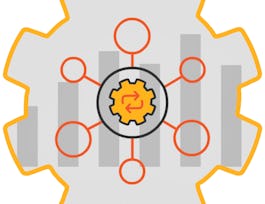This course is designed for Mechanical, Manufacturing, and Mechatronics Engineers. Throughout the course, students will obtain an extensive understanding of Product Life Cycle and Value Chain Management, Manufacturing Workflow, and integration into the Smart Factory concept. Participants will gain a holistic understanding of how these elements collaborate to revolutionize traditional production methods, driving us towards a more connected, efficient, and intelligent future.



Industry 4.0: PLM, Value Chain, and Smart Factory
This course is part of Digital Technology in Manufacturing Specialization

Instructor: Subject Matter Expert
Sponsored by Coursera Learning Team
Recommended experience
Details to know

Add to your LinkedIn profile
3 assignments
See how employees at top companies are mastering in-demand skills

Build your subject-matter expertise
- Learn new concepts from industry experts
- Gain a foundational understanding of a subject or tool
- Develop job-relevant skills with hands-on projects
- Earn a shareable career certificate


Earn a career certificate
Add this credential to your LinkedIn profile, resume, or CV
Share it on social media and in your performance review

There are 3 modules in this course
Product Life Cycle Management (PLM) and Value Chain Management (VCM) converge to revolutionize Digital Manufacturing, facilitating seamless coordination across product phases and supply chain operations. PLM serves as the cornerstone, orchestrating design, engineering, and manufacturing processes with digital innovations like AI and IoT enhancing efficiency. Integration with ERP systems fosters real-time data sharing, optimizing decision-making and promoting competitiveness in Industry 4.0.
What's included
14 videos1 assignment
Digital Manufacturing revolutionizes the manufacturing workflow with automation and advanced technologies like RPA and digital twins, enhancing efficiency and quality management. Automated Guided Vehicles (AGVs) and machine health monitoring further optimize material handling and equipment maintenance, ensuring operational continuity and efficiency. Manufacturing analytics and smart material flow enable data-driven decision-making and real-time tracking, while mobile applications enhance flexibility and accessibility, shaping a more intelligent and responsive production environment.
What's included
12 videos1 assignment
The Smart Factory revolutionizes manufacturing with advanced connectivity and technology, enhancing efficiency and agility. Through the Connected Factory, IIoT enables seamless integration and real-time data exchange, while Smart Energy Management and predictive maintenance optimize operations and sustainability. Industrial Remote Monitoring extends operational oversight beyond physical boundaries, ensuring continuity and rapid response, while augmented reality enhances visualization and maintenance procedures, shaping a more efficient and innovative manufacturing landscape.
What's included
14 videos1 assignment
Instructor

Offered by
Why people choose Coursera for their career




Recommended if you're interested in Physical Science and Engineering

Automation Anywhere

Technical University of Munich (TUM)

Rutgers the State University of New Jersey

Open new doors with Coursera Plus
Unlimited access to 10,000+ world-class courses, hands-on projects, and job-ready certificate programs - all included in your subscription
Advance your career with an online degree
Earn a degree from world-class universities - 100% online
Join over 3,400 global companies that choose Coursera for Business
Upskill your employees to excel in the digital economy



